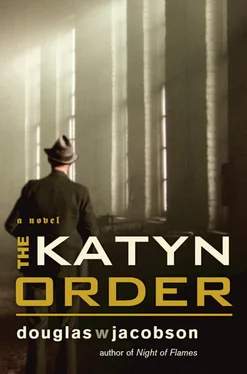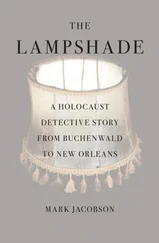Eight months ago I descended into hell. I have seen the abyss, the dark chasm of depravity into which man can sink. And I am terrified. I am terrified the world does not know what is happening here. I fear most will not live to tell their story, so I will tell mine and pray that it will emerge from the darkness—that the world may know.
In November of 1939 I was arrested in Krakow, along with two hundred other professors, lawyers and doctors who had been invited to a seminar at the university. German soldiers, storm troopers of the SS, marched into the assembly and forced us out at gunpoint. We were loaded into trucks, then into foul-smelling railcars. For five days we had no food, almost no water. We had no room to lie down. I was sure this was hell. And then we arrived in Oranienburg, Germany, and entered Sachsenhausen—a large camp, enclosed with brick walls and barbed wire fences.
Then I knew what hell truly was.
Perhaps someday I will have the courage to write about life in that dark abyss. Thousands of us labored at back-breaking jobs with little food or water in a camp so filthy and infested with rats and lice that most died of typhus within six months. Perhaps someday, when the memory is not so fresh and raw, I will be able to write about it… but not today.
Today is the tenth of August, 1940, and I will begin to record the incredible events that have transpired since my unexpected and abrupt release from Sachsenhausen one month ago. The story begins on the morning of my last day in that living hell.
10 July 1940
During the morning roll-call I was pulled from the ranks and marched to the commandant’s office. I was confused and frightened. No one had ever been pulled from the roll-call and taken to the commandant before. If anyone committed an offense they were just shot on the spot and dragged away, their body thrown onto a cart with the other dead.
The commandant’s deputy, Ludwig Rehm, and our block leader, Hans Fricker, were waiting for me in the office. Rehm glared at me for a long time, his coal black eyes and red, twitching face a mask of hate. Abruptly he spit in my face. Then he turned away and nodded at Fricker, who told me I was being released into the custody of the Governor General of Poland and would be transported back to Krakow.
I was so astonished, I was certain I hadn’t heard him correctly. Fricker pointed to a suit of clothing hanging on a hook. When I took the clothing, he gave me a shove. He took me to the guard’s quarters and ordered me to shower and change clothes. He handed me a small vial of kerosene to kill the lice in my hair. Though in a state of shock from the incredible news, I lingered as long as I dared, reveling in the luxury of soap and water. It was the first shower I’d had in eight months.
I arrived back in Krakow after two days traveling. This time I had a seat in a normal railcar, guarded by a pair of drunken Wehrmacht soldiers. Apparently I was no longer of interest to the SS.
I was taken by auto to Wawel Castle and locked in a small, but clean, room in the lower level. I had no idea why this was happening or what fate awaited me but, strangely, I was not afraid. Perhaps it was because I could not conceive of anything worse than the hell of Sachsenhausen where I would certainly have died. My heart grieves for my friends, those whom I have left behind. There is little chance any of them will survive.
I had a dark sense of foreboding at what I would find here in Krakow. But I was also intrigued at the prospect of seeing the Governor General of Poland. I had learned he was the German legal scholar Hans Frank, with whom I became acquainted while attending European legal conferences in the ’30s. My memory of Frank was of a highly intelligent, if somewhat conflicted, man caught up in an impossible situation during the rise of Nazism.
We had last met in 1935, in Germany, at a conference of the Academy of German Law, which Frank founded, and we corresponded on a regular basis for several years afterward. Frank was, at that time, a zealous proponent of human rights and an independent judiciary. But over the years, as fascism tightened its grip on German society, the tone of his letters changed, and I sensed he knew he was fighting a losing battle. Our correspondence had ceased, of course, with the German invasion of Poland. I had already been arrested and deported to Sachsenhausen by the time Frank came to Krakow as Governor General.
26 July 1940
On this day I met the Governor General of Poland. Since arriving in the city on 12 July, I had been confined to my room. I had seen no one except the guards who brought me two meals and tea each day. I had been allowed to bathe and given clean clothing. I put on weight and regained much of my strength. But all the time I couldn’t help thinking about my new captor, Hans Frank. Why was I here? What did he want from me?
Following the morning meal, I was led up to the third floor of the castle, shown into a large, well appointed office and left alone. A moment later the door opened, and a German officer stepped in. Though I hadn’t seen him in five years, I instantly recognized Hans Frank.
He bowed slightly, clicked his heels and addressed me by name. He offered me a chair and a cup of coffee, and we talked for more than an hour. It was perhaps the most bizarre hour of my life. Here was a man I had known as an intelligent, widely respected legal scholar, one of the best in Germany if not all of Europe—a man with whom I had discussed ideas, debated legal positions and corresponded with for years. And on this day, cast on opposite sides of a brutal war, we sat in a room adorned with the swastika flag and the Nazi eagle, in the royal castle of Poland, and chatted about old times. I could barely sit still, so great was my anguish over the atrocities I had witnessed at Sachsenhausen: the beatings and murders, the inhuman brutality—atrocities that Frank certainly knows about, has perhaps even ordered.
The meeting ended abruptly when an aide knocked on the door, explaining that Frank had a telephone call.
That afternoon I was transferred to a larger room at the other end of the castle. The room had a desk and chair and a box of German language books. As I sat at the desk, I could not imagine what was in store for me. But that was insignificant next to the question burning a hole in my heart. Was it possible that I would be reunited with my dear wife, Beata? Could God be that generous?
2 August 1940
After days of waiting I was finally led from my room to an automobile outside the castle. A moment later, Hans Frank joined me in the backseat. As we drove through the streets of Krakow, my beloved city that I hadn’t seen in almost a year, it was all I could do to control my emotions. Red-and-black swastika banners flew from every flagpole. Placards with the German word ACHTUNG in bold, black letters across the top, followed by lists of rules and regulations, were posted on buildings. People stood in long queues at bakeries, their faces gray and drawn, their heads bowed. The streets were practically deserted, the only other vehicles being German military trucks and the long, black autos of the Gestapo.
Frank leaned over suddenly and said that he would explain how things are to be in Poland. There will be no education for Poles beyond the fourth grade. The universities and libraries will remain closed. All Polish press, theatre and cabarets will be censored. References to Polish history, culture and literature will not be tolerated. Possession of radios by Poles is prohibited and will be replaced with loudspeakers in public areas.
This was a different Hans Frank from the other day. This Frank was stiff, unsmiling and authoritarian. I listened silently, my heart sinking with the realization that the Germans intend to destroy the very fabric of Polish life, to reduce us to a nation of slaves. My despair turned to anger. I struggled to maintain control, forcing myself to remember that the man sitting next to me was no longer the scholarly, affable gentleman I had known, but the Nazi governor overseeing the occupation of my country. My skin crawled.
Читать дальше












